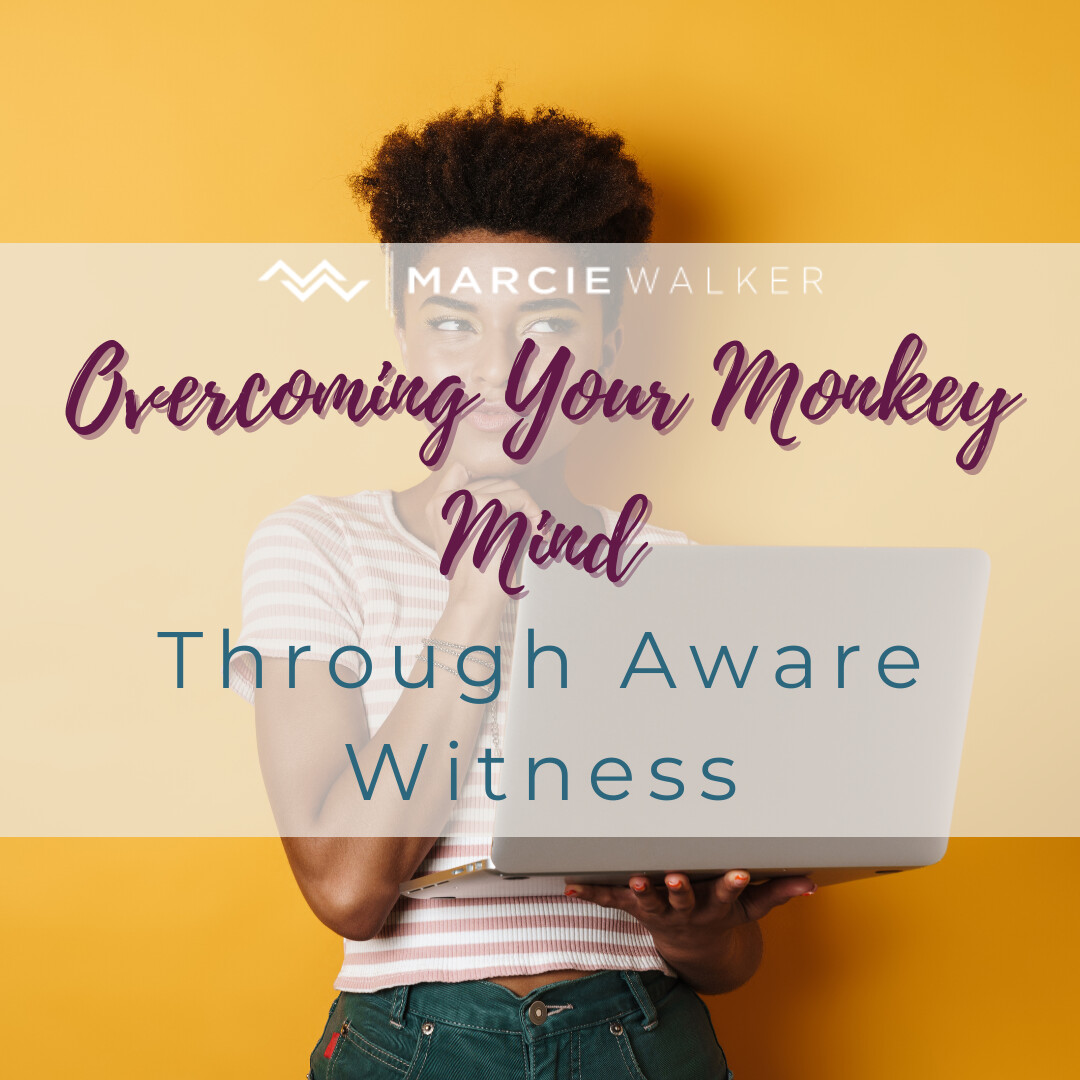
Overcoming Your Monkey Mind Through Aware Witness
My clients own their circumstances and take control of their lives with practical tools that help them relieve stress, stop suffering, and find solutions. In my experience as a stress relief and purpose expert, I have found that one of the most significant sources of anxiety and stress is the “Monkey Mind.” To understand the Monkey Mind, one must first understand the three types of brains.
Three types of brains
Our brain can be separated into three sections: our human brain, lizard brain, and monkey brain.
Human brain
The “human brain” is the most advanced part of the brain responsible for logical, emotionless thought, and delayed gratification. When we use the “human” part of our brain, we can think through our responses rather than just react. When we face threats to our system, we don’t have time to stop and analyze what’s going on. This phenomenon is known as the fight or flight response – the automatic physiological reaction to an event perceived as stressful or frightening. Our “lizard” and “monkey” brains take over during fight or flight to ensure our safety.
Lizard brain
The “lizard brain” is located at the base of the brain and contains the brain stem and cerebellum. This part of our brain is referred to as the “lizard brain” because lizards only have these elements of the brain. These elements control our most basic instincts, including:
- fight
- flight
- feeding
- fear
- freezing up
- fornication
Monkey brain
The “monkey brain” includes most of our tissue and controls more complex tasks, including emotions. Most mammals lead with their “monkey brain,” fueled by our most basic responses to fear and desire. The monkey brain is also known as the “monkey mind.”
The monkey mind in Buddhism
Buddhism references the “monkey mind,” describing “being unsettled, restless, or confused.” According to Huffington Post, Buddha described our minds as “filled with drunken monkeys, jumping around, screeching, chattering, carrying on endlessly.” Buddha said, “We all have monkey minds. With dozens of monkeys all clamoring for attention.” The monkey mind is often called the inner critic, ego, or protective personality. Buddhists describe the ego as “the one I have taken myself to be.”
Understanding the monkey mind
Each person’s Monkey Mind is unique, shaped by the experience they went through growing up. Understanding someone’s Monkey Mind starts with looking into the past. The Monkey Mind latched on to what occurred in our childhood, and it uses those events to color all of our interactions – often without us knowing it.
Our beliefs about ourselves and the world, which were formed through our programming, determine our everyday experiences. While our programming was primarily developed through shame-inducing messages from the adults who raised us along with other impactful experiences, we went through in life, including:
- bullying,
- trauma,
- heartbreak,
- and failure
Over time our belief slowly transformed into the negative waves that direct how we view the world today; this mindset is the Monkey Mind.
We call this mindset the Monkey Mind because it is less mature and evolved than the other aspects of our mind, the thought processes. The monkey mind is quick to react to something it doesn’t agree with, as well as blame something or someone else for our problems. It wants to keep us focused on how everything outside ourselves is why our lives are the way we want them to be.
Example of the Monkey Mind mindset
- If ________ wasn’t so ___________, you wouldn’t be so ____________.
- If ________ hadn’t been ________, you wouldn’t have been __________ and _________ would have gone better.
- If your _________ didn’t have such high expectations for you, you’d __________.
How the Monkey Mind works against progress
The Monkey Mind also keeps a memory bank of all the criticisms and judgments we’ve adopted from our programming. If we ever get to the point where we stop blaming others and want to take responsibility for our circumstances, the Monkey Mind loves to remind us about the shame-inducing beliefs we’ve developed about ourselves.
Example of the Monkey Mind and shame-inducing beliefs
- You haven’t ______________ because you’re not smart enough. Everyone knows it.
- That ________ went terribly because you look fat in that outfit. No one is attracted to you.
- Your _____________ is embarrassed by your failure. That’s why they ______________.
This inner critic makes it highly challenging to create the life we want for ourselves, as it produces an immense amount of anxiety that handles away our confidence, driving us to engage in an endless list of negative behaviors such as:
- drink alcohol
- use drugs
- isolate ourselves from others
- yell at our kids
- get divorced
- give up on our dreams
The Monkey Mind fuels and drives anxiety
For generations, we’ve normalized the Monkey Mind’s critical voice and the vast amounts of anxiety it creates. We’ve arrived at the point where we aren’t aware of how much our anxiety rules our lives. When we’re in line with the bank, we’re anxious because it’s taken too long. When we forget to call the client, we’re anxious because we might have lost the deal. When we don’t wear makeup to the grocery store, we’re anxious about how others are perceiving us. Anxiety is so constant that we don’t even question it.
For example, think about how many of us grab a drink at an event to take the edge off. Where does this edge come from? The Monkey Mind creates stories and judgments about how we need to act because we’re not conscious of this inner critic; we’re equipped to deal with it. This ritual of drinking to minimize anxiety has become completely socially acceptable.
Overcoming anxiety created by the Monkey Mind through the Aware Witness
To move past the anxiety our Monkey Mind has created, we must listen to different perspectives, observing: the Aware Witness. The Aware Witness doesn’t look to other people or situations as a source of our troubles. Instead, it offers an objective perspective inhibited by our judgmental programming. This point of view understands that the source of our upset or delight is within ourselves. The Aware Witness can offer wisdom by witnessing and learning from the Monkey Mind. Often, being aware of our shadows allow us to see that light we can offer the world.
Shifting into the Aware Witness’ perspective is so powerful because our mindset affects everything we do. When we move away from the Monkeys Mind’s judgmental perspective, we open ourselves up to an abundance of opportunities and experiences. Relationships that once seemed doomed can begin to flourish, and endless cycles of addictive behavior can be resolved in unattainable joy. When you address the root cause of your problems, your programming, everything else will start to fall into place.
Understanding Monkey Mind through Aware Witness
When we listen to the Monkey Mind, we launch into finding a reason why the circumstances aren’t our fault, which doesn’t resolve anything and aggravates the situation. With Aware Witness, we take full ownership of our beliefs and have the power to change how we respond to any circumstance.

How Marcie Walker can help you overcome Monkey Mind
The 5-Step PAUSE Model
I use the 5 Step PAUSE Model to boost productivity, decrease stress, and increase wellness. Depending on how long certain circumstances have been ignored, I may spend more time in one area of the model than others.
The second step of the PAUSE Model deals with Aware Witness. Together we can manage your inner state and observe your “situation” without judgment or opinion. By stepping out of the drama of life with a certified expert, you will gain insight from a clear perspective.
Addressing Monkey Mind with hypnosis
Using hypnosis to address problems allows you to relax. Once in a relaxed state, physically, the Monkey Mind is no longer in a threat state, looking for threats and triggering biological responses. Once the body relaxes, the mind relaxes, and we can talk to the subconscious mind (this is where the brain-based coaching and powerful questions come into play). Then you get insight to help you through a situation. Contact me to start your journey of positive life changes.



















0 Comments